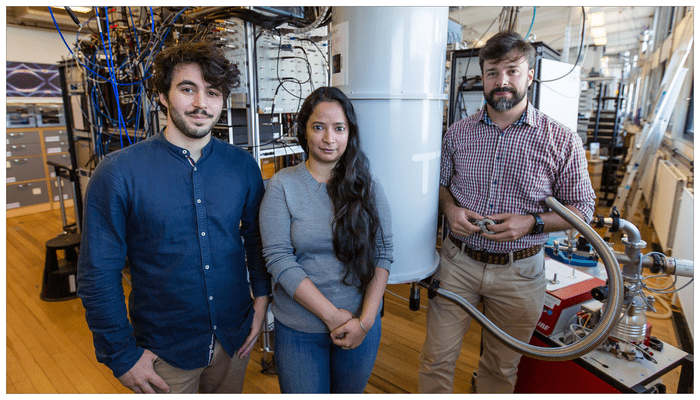The year-that-went was one of general precarity, as fragile attempts at economic recovery were steamrolled by fresh waves of COVID,
Meanwhile, the arts industries squared up to asphyxiating restrictions, while meeting friends to soothe the nerves was marred by anxiety and awkward distancing.
Science thriving
But necessity is the mother of invention and, in the face of all the challenges, science has thrived.
In Denmark, the world’s first wind-energy island was proposed (and South Korea quickly followed suit), a new species of whale was identified, and a dodgy GPS signal led to the accidental discovery of the world’s most northerly island.
Biggest impact
The biggest revelations hit the headlines far beyond Denmark’s borders.
Selected for their impact, innovation and socio-cultural significance, here are Denmark’s top five most exciting scientific discoveries of 2021.
1 Innovative chip resolves quantum computing headache
In October, two young physicists at the University of Copenhagen put us a step closer to building the first large, functional quantum computer. A little background: the brain of a supercomputer is made up of memory devices called qubits. While an ordinary bit can store data in a state of either 1 or 0, a qubit can reside in both states simultaneously – known as quantum superposition. Until now, researchers have managed to build small circuits, in which only one qubit can be operated at once. So it was hailed as a global milestone when Professor Federico Fedele and Assistant Professor Anasua Chatterjee simultaneously operated and measured multiple ‘spin qubits’ on the same quantum chip – the entirety of which was no larger than a single bacterium.
2 Broad horizons for broad beans
Broad beans are rich in protein, easy to grow and Jamie Oliver – the standard marker of populist cuisine – makes a dip out of them. But they also produce vicin – poisonous to over 400 million people in the world who are predisposed to the hereditary disorder favism. For these people, primarily in Asia, Africa and the Mediterranean countries, vicin can trigger acute anemia and liver disorders. In July, researchers in Copenhagen and Aarhus isolated the gene responsible for forming vicin in broad beans, paving the way for a vicin-free bean that could become a major future protein-source … or make a globally appealing appetiser.
3 Metal detector rookie finds 1kg trove of ancient gold
In an absurd stroke of beginner’s luck, a man called Ole Ginnerup Schytz found fame in September when he picked up a metal detector for the first time and discovered a stunning cache of 6th century gold jewellery near the town of Jelling in Denmark. Experts dubbed it one of the most valuable archaeological finds in Denmark’s history – on a par with the Golden Horns of Gallehus. The hoard’s enormous wealth points to a prolific European trade network and suggests Jelling was a major seat of power. The jewellery will go on display at Vejlemuseerne in southern Jutland on 3 February 2022, before being rehomed in the National Museum.
4 ‘Hotrocks’ could spell the end for lithium batteries
In May, construction began on GridScale – a remarkable new energy plant on the island of Lolland that can store renewable energy in stone. The method involves super-heating and super-cooling crushed pea-sized basalt in insulated steel tanks. The stone can store heat for many days and supply energy for up to a week – outperforming lithium batteries on both cost and efficiency. The 35 million kroner plant was quickly dubbed ‘hotrocks’ by the international community and will continue to be a hot topic into 2022, when moves will be made to integrate it in the Danish national grid.
5 Malaria medicine found to combat COVID-19
In December, researchers at Aarhus University discovered that the malaria medicine Atovaquone can prevent COVID-19 infection. The medicine has a protective effect both before and after infection across different viral variants – meaning it could be used for both prevention and treatment of COVID-19. It’s a big find: Atovaquone is inexpensive, widely available and has already been approved by the US Food and Drug Administration. It’s yet to be tested on Omicron, however, and has only been studied using lab-grown human cells.















